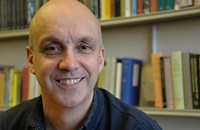Historian elected Fellow of the Academy of Social Sciences

Professor Phillipp Schofield
09 March 2016
Professor Phillipp Schofield, Professor of Medieval History at Aberystwyth University has been elected as Fellow of the Academy of Social Sciences.
A leading international researcher in medieval economic and social history, with a particular interest in matters of credit and debt, Professor Schofield is one of forty-two leading social scientists to be recognised by the Academy.
Following the announcement, Professor Schofield said: “I am delighted to be elected as a Fellow of the Academy of Social Sciences.
“As a medieval historian, my involvement in the social sciences comes from two main directions. In my own work, which is directed mostly at the study of rural society in the middle ages, I focus in particular on topics that have a wider application within social science. So, themes such as the social and economic response to crisis and population change are central to a great deal of what I do, as is an interest in the use of law in past societies. Secondly, but also importantly for me, my work as an editor of two leading journals (Continuity and Change, 1999-2011; Economic History Review, 2011-present) and of an international series on agrarian society, is closely associated with a social science agenda within the study of history.
“I see my own appointment as a fellow of the Academy as an opportunity to help foster social scientific work, especially within history – and certainly not least within medieval history - and to encourage activity that supports research and learning in this important area of our historical understanding.”
Professor Martyn Powell, Head of the Department of History and Welsh History at Aberystwyth University said: “We are delighted to hear this news. Phillipp has been a key figure in this department – leading it for 10 years – as well as being one of the most important social and economic historians working today.”
Professor Schofield studied for his first degree in ancient and medieval history at UCL in 1986 before completing his doctorate at the University of Oxford (Wadham) in 1992.
He also trained as a lawyer and worked briefly for a City law firm before returning to Oxford in 1993 where he held a research post at the Wellcome Unit for the History of Medicine; he moved to the University of Cambridge and the Cambridge Group for the History of Population and Social Structure in 1996 before taking up his post in Aberystwyth in 1998.
He is presently undertaking a Leverhulme Major Research Fellowship on the Great Famine in early fourteenth-century England. He is also engaged in writing up Arts and Humanities Research Council-funded research arising from projects on litigation on manorial courts and the use of seals in medieval Wales; a volume for Manchester University Press on Peasants and Historians: the historiography of the medieval English peasantry is to be published later this year.
AU9216



